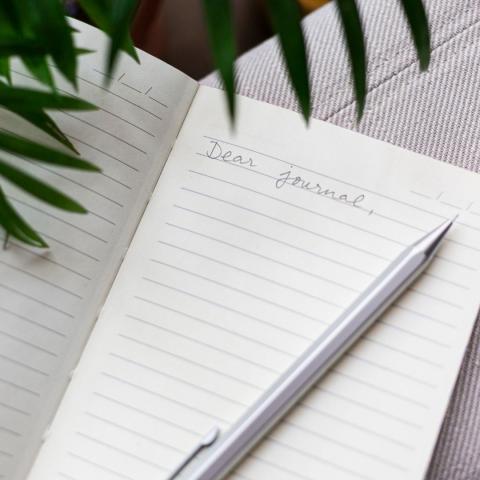
Why journal? To chart your progress, jot down ideas on the fly, list goals and challenges, record feelings, make lists, and so much more.
I have kept a journal on and off since I was in elementary school. Of course, I called it a diary back then, and poured my wildest dreams, deepest feelings, and biggest secrets in those padlocked pages—probably with a glittery purple gel pen! I felt unburdened after writing in my diary, like I had confided in a trusted friend and could now go on with my day.
Adulthood brings plenty of challenges for getting to the page, but the benefits are still there waiting for us. How many of us could benefit from a daily unburdening, if only to ourselves, to pages only we will see? Your journal is also a place where you can hone your writing skills, sharpen your cognitive and coping skills, improve your mood, and regulate your emotions. These mental health boosts can lead to permanent lifestyle changes if you keep up your journaling practice.
If you are interested in taking up your pen (again) to journal, step one is to determine what kind of journal you want to use. We’ve come a long way from the “Dear diary” days! When I recently returned to keeping a journal, it was because I had learned about the “five-minute journal” from a guest on a favorite wellness podcast. But there are plenty of options. Check out these five types of journals to keep:
Personal
Maybe you think keeping a journal is for teenagers, but a personal journal is a great way to stay in the habit of daily writing. A journal’s great appeal is that it is yours and yours alone; there is no audience, no deadline, and no agenda, so you can write freely, digging into and exploring your emotions. For personal purposes, choose a journal that appeals to your aesthetic sensibilities–something that comforts you, something you will want to pick up and come back to each day, maybe featuring a buttery leather cover or a stunning photograph. Even if the writing you do on these pages isn’t creative or literary–or even in complete sentences–journaling on a regular basis will make writing habitual for you, and it will be easier to stay committed to a future creative writing project.
Project-related
And when you do have a creative writing project, why not journal about it? Writing is frequently a solitary practice, and it can be difficult to recognize our own progress sometimes. Keeping a journal about writing is a way to log challenges, successes, and aspirations, or to jot down ideas in fragment form. You might keep a list of possible titles, the names of authors you want to read, or an outline of a future chapter there, too. For this type of journal, you might want to choose a book with multiple sections, divided by folders, so you can track several projects at once. Writing about writing might seem like overload, especially if your project journal is a second journal; but it’s never a bad idea to track your progress.
Bullet
Have you heard about bullet journals yet? Dubbed “the analog system for the digital age,” the bullet journal is for people who want to be better organized, track their habits and practices, and for whom more traditional journaling hasn’t really “stuck.” Bullet journalers use a system of symbols and marks to quickly log current and future tasks. The concept is to turn your life into “bullet points” on paper in a hybrid diary/to-do-list/planner, where you can more easily plan for the short and long term. According to the website, you can pick any journal you want, but you need to be mindful of its size: “If it’s too big you’ll never take it with you. If it’s too small it will be impractical. Be sure to get something that’s rugged enough to keep up with you.”
Travel
Are you someone who loves to travel? Exploring different towns, cities, landscapes, countries, and continents can yield lots of material for writing projects—but how will you remember everything you see, touch, hear, smell, and taste if you don’t write it down? A well-traveled journal is the way to go. You might choose one with pocket flaps for tucking train or plane tickets, or with clear plastic sleeves for keeping photographs you snap on your journeys. A travel journal should slip neatly into your favorite carry-on bag. You might even want a small pocket journal for every trip you take.
Gratitude
Writing can be incredibly rewarding; it can also be frustrating, lonely, and mired with rejection and uncertainty. Keeping a gratitude journal, besides being yet another way to work writing into your everyday life, might be just the balm you’re seeking. What’s true of spirituality is true for writing: focusing on what you’re grateful for can be a way to stay centered on positivity and the elements of your life that are within your control. You don’t have to elaborate on your gratitude; studies show that the simple act of writing down a few things you’re grateful for each day is enough to improve your empathy, psychological health, sleep, self-esteem, and mental strength (all of which are necessary for writing!). Maybe one day you’ll write, “Today I am grateful for having finished my novel,” then flip back 100 pages or so and read, “Today I am grateful for having written my novel’s first sentence”—how’s that for tangible proof of how far you’ve come? Like a project-related journal reminds us of our progress in writing, a gratitude journal can be a healing reminder that there is always something for which to be grateful.
Do you keep any of these types of journals, and if not, which one appeals to you most? Share with us in the comments.
Related reading: Writing is wellness! The process of writing “well”
How expressive writing can keep you afloat
Want to receive tips and inspiration like this in your inbox every Sunday morning? Join our email list community! You will receive weekly advice, a year’s worth of weekly writing prompts as a FREE download, and be eligible to participate in our monthly photo prompt contest for a chance to share an original piece of writing with our community of over 1,500 subscribers!
